新概念2 Lesson 4 教案
- 格式:pdf
- 大小:172.67 KB
- 文档页数:8
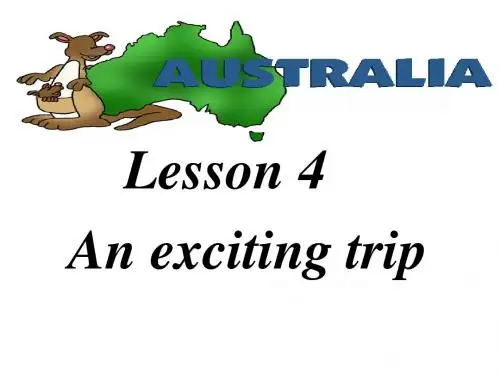
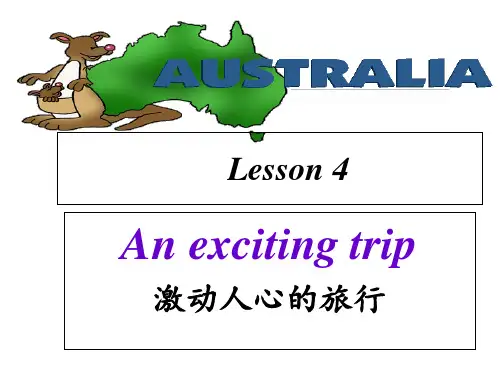
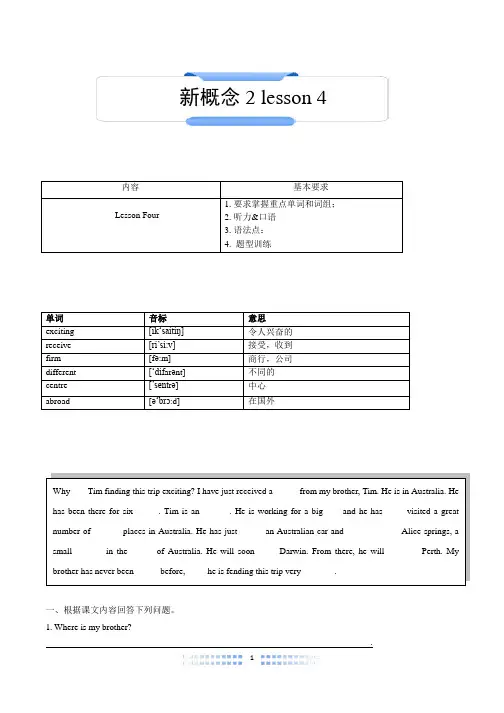
内容 基本要求Lesson Four1. 要求掌握重点单词和词组;2. 听力&口语3. 语法点:4. 题型训练单词 音标 意思 exciting [ik‘saitiŋ] 令人兴奋的 receive [ri’si:v] 接受,收到 firm [f ə:m] 商行,公司 different [‘dif ar ənt] 不同的 centre [’sent r ə] 中心 abroad [ə‘brɔ:d]在国外一、根据课文内容回答下列问题。
1. Where is my brother?.Why ___ Tim finding this trip exciting? I have just received a _____ from my brother, Tim. He is in Australia. He has been there for six _____. Tim is an ______. He is working for a big ___ and he has ____ visited a great number of ______ places in Australia. He has just _____ an Australian car and ___ _____ ___Alice springs, a small ______ in the _____ of Australia. He will soon ____ Darwin. From there, he will ___ ___ Perth. My brother has never been _____ before, ____ he is fending this trip very _______.新概念2 lesson 42. How long has my brother been there?.3. Where did Tim work?.4. Is Tim fond of traveling?.5. Did Tim visit a number of places in Australia?.6. What will Tim do as he writes in his letter?.二、根据答案,对本文章进行口头转述。
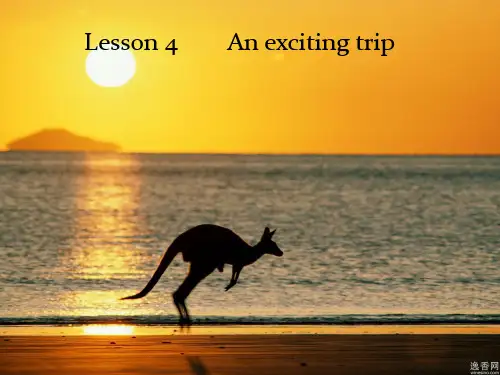
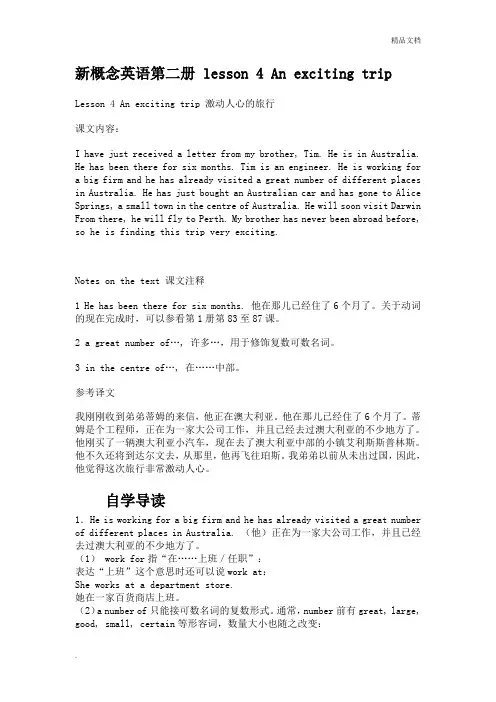
新概念英语第二册 lesson 4 An exciting trip Lesson 4 An exciting trip 激动人心的旅行课文内容:I have just received a letter from my brother, Tim. He is in Australia. He has been there for six months. Tim is an engineer. He is working for a big firm and he has already visited a great number of different places in Australia. He has just bought an Australian car and has gone to Alice Springs, a small town in the centre of Australia. He will soon visit Darwin From there, he will fly to Perth. My brother has never been abroad before, so he is finding this trip very exciting.Notes on the text 课文注释1 He has been there for six months. 他在那儿已经住了6个月了。
关于动词的现在完成时,可以参看第1册第83至87课。
2 a great number of…, 许多…,用于修饰复数可数名词。
3 in the centre of…, 在……中部。
参考译文我刚刚收到弟弟蒂姆的来信,他正在澳大利亚。
他在那儿已经住了6个月了。
蒂姆是个工程师,正在为一家大公司工作,并且已经去过澳大利亚的不少地方了。
他刚买了一辆澳大利亚小汽车,现在去了澳大利亚中部的小镇艾利斯斯普林斯。
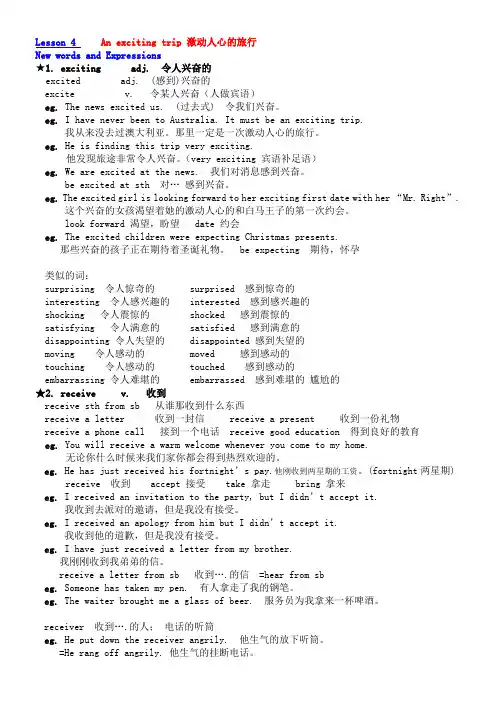
Lesson 4 An exciting trip 激动人心的旅行New words and Expressions★1. exciting adj. 令人兴奋的excited adj. (感到)兴奋的excite v. 令某人兴奋(人做宾语)eg. The news excited us. (过去式) 令我们兴奋。
eg. I have never been to Australia. It must be an exciting trip.我从来没去过澳大利亚。
那里一定是一次激动人心的旅行。
eg. He is finding this trip very exciting.他发现旅途非常令人兴奋。
(very exciting 宾语补足语)eg. We are excited at the news. 我们对消息感到兴奋。
be excited at sth 对…感到兴奋。
eg.The excited girl is looking forward to her exciting first date with her “Mr. Right”.这个兴奋的女孩渴望着她的激动人心的和白马王子的第一次约会。
look forward 渴望,盼望 date 约会eg. The excited children were expecting Christmas presents.那些兴奋的孩子正在期待着圣诞礼物。
be expecting 期待,怀孕类似的词:surprising 令人惊奇的 surprised 感到惊奇的interesting 令人感兴趣的 interested 感到感兴趣的shocking 令人震惊的 shocked 感到震惊的satisfying 令人满意的 satisfied 感到满意的disappointing 令人失望的 disappointed 感到失望的moving 令人感动的 moved 感到感动的touching 令人感动的 touched 感到感动的embarrassing 令人难堪的 embarrassed 感到难堪的尴尬的★2. receive v. 收到receive sth from sb 从谁那收到什么东西receive a letter 收到一封信 receive a present 收到一份礼物receive a phone call 接到一个电话 receive good education 得到良好的教育eg. You will receive a warm welcome whenever you come to my home.无论你什么时候来我们家你都会得到热烈欢迎的。
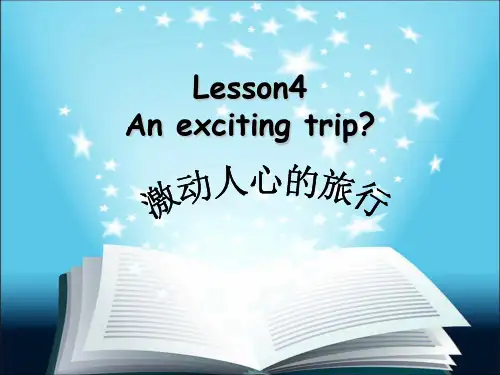
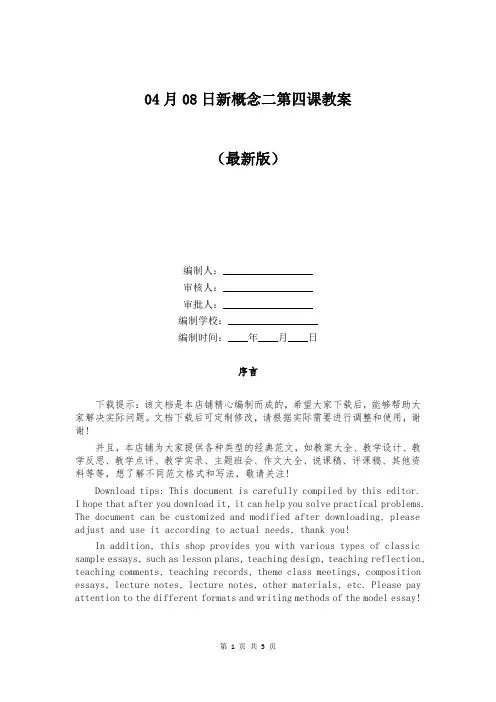
04月08日新概念二第四课教案(最新版)编制人:__________________审核人:__________________审批人:__________________编制学校:__________________编制时间:____年____月____日序言下载提示:该文档是本店铺精心编制而成的,希望大家下载后,能够帮助大家解决实际问题。
文档下载后可定制修改,请根据实际需要进行调整和使用,谢谢!并且,本店铺为大家提供各种类型的经典范文,如教案大全、教学设计、教学反思、教学点评、教学实录、主题班会、作文大全、说课稿、评课稿、其他资料等等,想了解不同范文格式和写法,敬请关注!Download tips: This document is carefully compiled by this editor.I hope that after you download it, it can help you solve practical problems. The document can be customized and modified after downloading, please adjust and use it according to actual needs, thank you!In addition, this shop provides you with various types of classic sample essays, such as lesson plans, teaching design, teaching reflection, teaching comments, teaching records, theme class meetings, composition essays, lecture notes, lecture notes, other materials, etc. Please pay attention to the different formats and writing methods of the model essay!04月08日新概念二第四课教案Lesson 4 An exciting trip 激动人心的旅行NEW WORDS AND EXPRESSIONSexciting adj. 令人兴奋的excite:激动excited:-ed: 自己感到-ing:令人感到exciting boy interesting man The man is interesting. The news exciting,I am excited 其宾语一定是人 The news excited me. 让后面的人感到... interesting:令人感到有趣的 interested: 感到有意思的 The book interests me. receive v. 接受,收到accept:同意接收 receive:客观的收到 This morning I received a bunch of flowers from a boy,but I didn't acceptit. take take the exam:接收考试;take advice接收建议 receive/have receive/have a letter from somebody. firm n. 商行,公司company different adj. 不同的 centre n. 中心 abroad adv. 在国外副词,直接和动词连用 go aroad live abroad study abroad【Text】I have just received a letter from my brother, Tim. He is in Australia.He has been there for six months. Tim is an engineer.He is working for a big firm andhe has already visited a great number of different places in Australia.He has just bought an Australian car and has gone to Alice springs,a small town in the centre of Australia. He will soon visit Darwin.From there, he will fly to Perth. My brother has never been abroad before,so he is fending this trip very exciting. 参考译文我刚刚收到弟弟蒂姆的来信,他正在澳大利亚。

主讲:Mike有兴趣的可以加我的QQ :290143015我们可以一起交流英语,互相学习,交流好的英语课件,交流好的英语口语!期待你的到来!Being Excellent Is What Never Dies-----MikeMike 更多资料在地址:/?busin ess&aid=6&un=wdeshouji#7欢迎大家下载、交流。
!开始学习吧!Mike 语法经典讲解词法部分完型填空考查内容语篇信息词汇手段语法手段逻辑手段复现同现替代省略顺序关系并列关系分指关系转折关系解释关系因果关系语法项目新概念英语第二册Lesson 4An exciting trip 主讲:MikeToday we’ll listen to a story about an exciting trip in Australia.KEY WORDS ANDEXPRESSIONSexcitinga.令人兴奋的receive a letter收到一封信firmn.公司a great number of许多differenta.不同的in the centre of在…中部abroad在国外Alice Springs 艾利斯·斯普林斯Darwin达尔文Perth珀斯Questions:How long has Tim been in Australia? What does he do in Australia?Why is Tim finding this trip exciting?Question 1:How long has Tim been in Australia?Question 2:What does he do in Australia?Question 3:Why is Tim finding this trip exciting?Answer :Tim has been in Australia for six months.Answer :He is working for a big firm as an engineer.Answer :Because Tim has never been abroad before.He is working for a big firm and he has already visited a great and he has already visited a great number of different places in Australia. He has just bought an firm = companywill fly to Perth. My brother has never been aboard before, so a great number of = a great many 【后跟可数名词复数】a great amount of 【后跟不可数名词,如money 】I have just received a letter from my brother, Tim. He is inhe is finding this trip very exciting.have been to someplace 已经去过某地(可能已回)have gone to someplace 已经去了某地(不在此地)Abroad 作为副词,可用于以下词的后面:be / go / study / travel / liveAustralia. He has been there for six months. Tim is an engineer. He is working for a big firm and he has already visited a great number of different places in Australia. He has just bought an Australian car and has gone to Alice Springs, a small town in the centre of Australia. He will soon visit Darwin. From there, he will fly to Perth. My brother has never been aboard before, so he is finding this trip very exciting .find+名词+形容词:觉得…怎么样I find this book very interesting.Did you find this movie boring?take a trip to…I am planning to take a trip to Tibet.★语法I have just received a letter from my brother, Tim. He is in Australia. He has been there for six months. Tim is an engineer. He is working for a big firm and he has already visited a great number of different places in Australia. He has just bought an Australian car and has gone to Alice Springs, a visit Darwin. From there, he will fly to Perth. My brother has never been aboard before, so he is I have just received a letter from my brother, Tim.He has been there for six he has already visited a great number of He has just bought an Australian car and has gone to Alice Springs brother has never been aboard before I have just received a letter from my brother, Tim.He is in Australia. He has been there for sixmonths.Tim is an engineer. He is working for a big firm and he has already visited a great number of different places in Australia.He has just bought an Australian car and has gone to Alice Springs , a small town in the centre of Australia. He will soon visit Darwin. From there, he will fly to Perth. My brother has never been aboard before , so he is finding this trip very exciting.现在完成时表示当前已经完成的动作,其基本句型结构为:have/has+过去分词I have just received a letter from my brother, Tim.He has been there for six months .He has already visited a great number of different places in Australia.My brother has never been abroad before .Have you ever been to the United States?I haven’t been very successful so far .The train has not arrived yet .I haven’t heard from him since 2008.语法重点掌握:just、already、yetI have just received a letter from my brother, Tim.He has just finished his homework.My mother has just bought a new hat.I have already made up my mind.She has already finished her housework.My father has already arrived there.I have not received my pen pal’s letter yet.She has not seen the famous singer yet.His brother has not been to Beijing yet.Have you read this book yet?Has he bought the mobile phone yet?Have they won the game yet?Homework:请用以上三个词分别造两个现在完成时的句子,完成后发送到E-mail:cothy20@,请在文档中注明学生姓名。

新概念第二册教案篇 1一、教学目标1. 使学生能够熟练掌握新概念第二册中的重点语法点,如时态、语态、虚拟语气等。
2. 显著提升学生的阅读理解能力,能够准确理解复杂的英语文章,并把握其中的关键信息。
3. 增强学生的英语写作技巧,使他们能够运用所学语法和词汇,写出逻辑清晰、语言准确的短文。
二、教学重点与难点1. 重点(1) 新概念第二册中的核心语法知识,包括各种时态的正确运用、被动语态的构成与使用、虚拟语气的表达等。
(2) 培养学生对长难句的理解和分析能力,提高阅读速度和准确性。
(3) 指导学生如何将所学的词汇和句型运用到写作中,丰富文章内容,提升写作水平。
2. 难点(1) 一些较为复杂和抽象的语法概念,如虚拟语气的各种形式和用法,学生可能理解和运用起来有困难。
(2) 对于一些英语基础较薄弱的学生,提高阅读理解能力可能需要更多的时间和练习。
(3) 如何引导学生在写作中避免中式英语表达,形成地道的英语思维和写作习惯。
三、教学方法1. 情景教学法通过模拟真实的英语场景,如购物、旅游、聚会等,让学生在具体情境中感受和运用所学的英语知识,增强语言的实际运用能力。
2. 任务驱动法给学生布置各种任务,如阅读分析文章、写作练习、小组讨论等,让学生在完成任务的过程中主动学习和探索。
3. 互动教学法鼓励学生积极参与课堂互动,如提问、回答、讨论、故事接龙等,激发学生的学习兴趣和积极性。
四、教学过程1. 课程导入(10 分钟)先通过简单的英语对话,了解学生对之前英语知识的掌握情况,然后引入新概念第二册的学习,提问学生对新概念教材的了解和期待。
比如说:“Hey, guys! How was your English study recently? Do you know something about New Concept English Book 2?”2. 语法讲解(30 分钟)结合教材中的具体课文,详细讲解重点语法点,如一般过去时、现在完成时、宾语从句等。
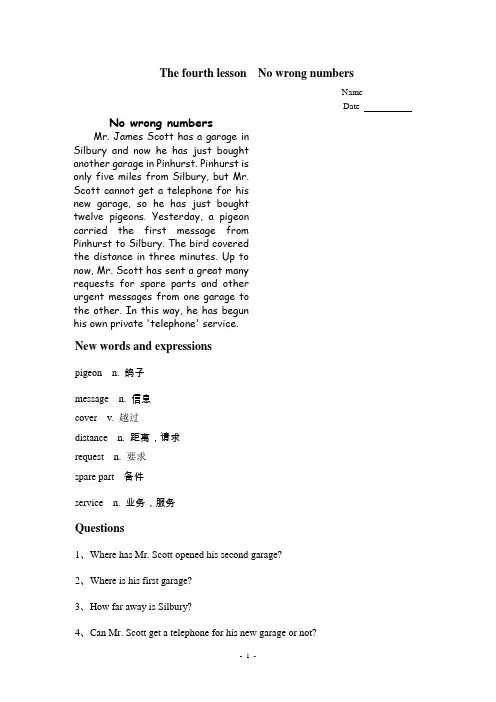
The fourth lesson No wrong numbersName __________DateNew words and expressionspigeon n. 鸽子message n. 信息cover v . 越过distance n. 距离,请求request n. 要求spare part 备件service n. 业务,服务Questions1、Where has Mr. Scott opened his second garage?2、Where is his first garage?3、How far away is Silbury?4、Can Mr. Scott get a telephone for his new garage or not?No wrong numbers Mr. James Scott has a garage in Silbury and now he has just bought another garage in Pinhurst. Pinhurst is only five miles from Silbury, but Mr. Scott cannot get a telephone for his new garage, so he has just bought twelve pigeons. Yesterday, a pigeon carried the first message from Pinhurst to Silbury. The bird covered the distance in three minutes. Up to now, Mr. Scott has sent a great many requests for spare parts and other urgent messages from one garage to the other. In this way, he has begun his own private 'telephone' service.5、What has he bought?6、In how many minutes do they carry messages from one garage to the other? Comprehension1 Mr. Scott hasn't got a telephone in his new garage because _________(a) it isn't far from his old garage, so he doesn't need one (b) he has twelve pigeons(c) he can't get one (d) it's too expensive2 Mr. Scott keeps pigeons because __________(a) he uses them to send messages (b) it's his hobby(c) he has two garages (d) he likes them Structure3 Mr. Scott has a garage. The garage is ________(a) to him (b)of him (c) of his (d) his4 Mr. Scott cannot get a telephone for his garage. _________he has just bought twelve pigeons.(a) That's so (b) That's why (c) Because (d) For5 He has just bought twelve pigeons. When did he _________ them?(a) bought (b) buys (c) buy (d) buying6 What's the distance from Pinhurst to Silbury? How ______ is Pinhurst ___ Silbury?(a) long ago ... until (b) long ... away (c) away ... till (d) far ... from7 The pigeon flew from one garage to the other ________ three minutes.(a) in (b) into (c) with (d) onV ocabulary8 Mr. Scott has a garage in Silbury. His ________ garage is in Pinhurst.(a) another (b) other (c) else (d) different9 Mr. Scott can't get a telephone. Te1ephones are hard to ________(a) take (b) receive (c) obtain (d) find10 He has sent requests for spare parts. He has __________ spare parts.(a) asked (b) asked for (c) begged (d) pleased11 Urgent messages are important, so they must be sent ________(a) quickly (b) slow1y (c) by hand (d) largely12 Mr. Scott' s 'telephone service' is private. It is _________(a) general (b) spare (c) secret (d) his own Structures and usage现在完成时与一般过去时的区别1)过去时表示过去某时发生的动作或单纯叙述过去的事情,强调动作;现在完成时为过去发生的,强调过去的事情对现在的影响,强调的是影响。
新概念英语第二册第四课教案第一篇:新概念英语第二册第四课教案Lesson 4 An exciting trip New Words and Expressions 1.exciting: creating or arousing excitement ;令人兴奋的What exciting news this is!这是多么令人兴奋的消息!That is an exciting game.那是一场令人兴奋的比赛。
It's such an exciting place.真是一个令人兴奋的地方。
This is a very exciting book.这是一本非常扣人心弦的书。
2.receive: 接受;收到receive an invitation[a letter]from sb 接到某人的邀请函[信]receive a sick person into a hospital 把病人收进医院receive guests warmly 热烈欢迎客人Did you receive any letters today? 你今天收到信了吗?The police received several complaints about the noise from the plant.警察局收到好几宗投诉, 抱怨工厂的噪音太大。
区别用法:receive, accept, take这三个词都有“接受”的意思。
receive只表示被动地接受Then he smiled and told me I would receive an extra £100 a year!后来他笑了,并且告诉我说,我将一年收到一百英镑的额外收入!If you receive a request like this, you cannot fail to obey it!如果你收到这样的一种请求,你不会不服从的!A baby can only receive sense impressions, but it can not understand them.婴儿只能接受感官方面的印象,而不能理解。
Lesson 4 An exciting trip 激动人心的旅行I have just received a letter from my brother, Tim. He is in Australia. He has been there for six months. Tim is an engineer. He is working for a big firm and he has already visited a great number of different places in Australia. He has just bought an Australian car and has gone to Alice springs, a small town in the centre of Australia. He will soon visit Darwin. From there, he will fly to Perth. My brother has never been abroad before, so he is fending this trip very exciting.我刚刚收到弟弟的来信,提姆。
他在澳大利亚。
他有六个月了。
提姆是一个工程师。
他是一家大公司工作,他已经访问了许多不同的地方在澳大利亚。
他刚买了一辆汽车和澳大利亚已经向爱丽丝斯普林斯,一个小镇的中心,澳大利亚。
他将很快访问达尔文。
从那里,他再飞往珀斯。
我兄弟从来没有出过国,因此他觉得这次旅行非常激动。
Notes on the text 课文注释1 He has been there for six months. 他在那儿已经住了6个月了。
关于动词的现在完成时。
2 a great number of…, 许多…,用于修饰复数可数名词。
3 in the centre of…, 在……中部。
Lesson 4 An exciting tripI have just received a letter from my brother, Tim. He is in Australia. He has been there for six months. Tim is an engineer. He is working for a big firm and he has already visited a great number of different places in Australia. He has just bought an Australian car and has gone to Alice Springs, a small town in the centre of Australia. He will soon visit Darwin From there, he will fly to Perth. My brother has never been abroad before, so he is finding this trip very exciting. Listening Practice.I have just received a letter from my _______, Tim. He is in Australia. He has been there for six months. Tim is an engineer. He is working for a big firm and he has already visited a great number of different places in Australia. He has just bought an Australian ______ and has gone to Alice Springs, a small ______ in the centre of Australia. He will soon visit Darwin. From there, he will fly to Perth. My brother has never been abroad before, so he is finding this trip very _______. Shadow PracticeWord PracticeFind out words you don ’t know.令人兴奋的_________________接受;收到________________商行;公司__________________ 不同的__________________中心__________________在国外__________________ Phrase Practice一次激动人心的旅行___________________________收到一封来自...的信___________________________在澳大利亚___________________________长达六个月___________________________一名工程师_________________________为...而工作___________________________一个大公司_______________________许多_______________________去了某地(去了未回)_________________________在...中心___________________________坐飞机去某地___________________去过某地(去了已回)_________________________发现这次旅行很令人激动___________________________Tense PracticeFind out the present perfect tense and transform the present perfect tense into original formSentence PracticeTranslate the sentences.我刚刚收到一封来自我弟弟Tim的信。
Lesson4An Exciting Trip★Warm up1、现在完成时和现在进行时2、同位语的用法★Listening1.How long has Tim been in Australia?2.What does he do in Australia?3.Has he already visited many places or not?4.Why is Tim finding this trip exciting?★Vocabulary●exciting[ɪkˈsaɪtɪŋ]adj.令人兴奋的【记忆】exciting=excite(使......兴奋)+ing(adj.&n.后缀)→令人兴奋的【拓展】excite v.使......兴奋excited adj.感到兴奋的(修饰人)exciting adj.令人兴奋的(修饰物)excitedly adv.兴奋地、激动地excitement n.兴奋、激动、令人兴奋的事exciter n.刺激者、激励者、刺激物、兴奋剂【拓展】动词→形容词interest v.使...感兴趣adj.interested感兴趣的;interesting有趣的surprise v.使...惊讶adj.surprised感到惊讶、吃惊的;surprising令人惊讶的trouble v.使...烦恼adj.troubled感到焦虑的、担忧的;troubling令人不安的;令人烦恼的satisfy v.使...满意adj.satisfied感到满意的、满足的;satisfying令人满意的,令人满足的bore v.使...厌烦adj.bored感到无聊的、烦人的;boring令人厌烦的、无聊的confuse使...困扰adj.confused感到糊涂的;confusing令人困惑的tire v.使...疲倦adj.tired感到疲倦的、困倦的;tiring令人疲倦的、累人的embarrass v.使....难堪adj.embarrassed感到尴尬的;embarrassing令人尴尬的scare v.使...惊吓adj.scared感到恐惧的、惊恐的;scaring令人害怕的worry v.使...担心adj.worried感到苦恼的、担心的;worrying令人担心的●receive[rɪˈsi:v]v.接受、收到receives(三单);receiving(现在分词);received(过去式/分词)【记忆】receive=re回+ceive取→收到[回信]【拓展】recipient n.接受者,感受者,容器receiver n.接受者、收款员、接收器receivership n.破产管理、破产清算【搭配】receive into接受,接纳receive sth from...从......收到某物receive a gift收到礼物receive an email收到邮件receive attention得到关注receive education接受教育⑴vt.接到、收到、得到She went to New York to receive the award in person.她亲自前往纽约领奖。
Lesson 4 An exciting trip首先,我们检查一下课文的背诵和生词的默写。
接下来我们来重点讲解课文。
1. exciting/excited我们在新1就讲过,-ed结尾的adj.指人,以-ing结尾的adj.指物,同样的:exciting adj. 令人兴奋的(物);excited adj. (人)兴奋eg: the news is exciting.一则令人兴奋的新闻exciting boy 令人兴奋的男孩I am excited. 我很兴奋excite v. 激动(这类动词的宾语一定是人,让后面的人感到……)eg: The news excited me.这则新闻另我激动。
2. receive① vt. 接到,收到,得到eg: When did you receive that letter?词组:receive a letter from sb = hear from sb 收到某人的来信vt. 招待,接待eg: You need a large room if you are going to receive so many guests.注:①receive 是“收到”,指的是一个被动的动作,主观上接受与否不清楚。
receive/have a letter from sb. 收到某人的来信receive education接受教育receive punishment 接受惩罚②accept 同意接收(主观上是否接受)eg: This morning I received a bunch of flowers from a boy, but I didn't accept it.③take则是主动的“拿”、“取”、“采纳”eg: I received a beautiful pen from my uncle. My brother took it from me yesterday.词组:take the exam 接受考试take advice 接受建议 3. 同位语I have just received a letter from my brother, Tim.这一句中,Tim就是my brother的同位语。
同位语是指一个名词(或短语等)与另一个名词(或短语)并列而作为其说明或限定成分,同位语与它所补充说明的成分之间用逗号隔开。
在译成汉语时,同位语或者插入主句中,或者另译为一句,很少像英语中那样用逗号隔开。
eg: This is John, one of my best friends. 这位是约翰。
他是我最好的朋友之一。
Mrs. Smith, my neighbor, has never been abroad. 我的邻居史密斯夫人从来没有出过国。
4. 现在完成时①复习:现完时表示过去发生或已经完成的动作对现在造成的影响或结果,或从过去已经开始,持续到现在的动作或状态。
eg: I have already finished my homework. 我已经完成了家庭作业Someone has just turned off the light. 有人刚把灯关了。
也可表示从过去某一时刻开始并一直延续到现在的动作或事情,但动作或事情可能仍在继续。
eg: I want to see how much the place changed since I saw it last.我想看看从上次见到那地方以来它发生了多大变化。
I have learnt English for more than ten years. 我已经学了10多年的英语②常与现在完成时时态标志:before (now)(以前);it’s the first time(第一次);so for(到目前为止);so far this morning(到上午为止);up to now(直到现在);up to the present(直到目前);just(刚刚);recently(最近);already(已经);lately(最近);now(现在);for 一段时间;since+时间;still(还;仍);at last(终于);finally(最终);疑问句和否定句中常用ever,yet,never,not…ever 等。
eg: I have lived here for several years . 我已经在这里居住几年了。
I’ve made many new friends since I have lived here.自从我住在这里已经结交了许多的朋友了。
③基本用法:主语是第三人称单数主语不是第三人称单数肯定句主语+has done+其他eg: He has seen thismovie.Lee has lived in Nanjingfor many years.主语+have done+其他eg: I have been a teacher since 3 years. They have eaten lunch.否定句主语+hasn’t done+其他eg: He hasn’t seen thefilm.Lee hasn’t lived inNanjing for manyyears.主语+haven’t done +其他eg: They haven’t worked.We haven’t gone to the HK.疑问句Has+主语+done+其他eg: Has she heard fromher family recently?Have+主语+done+其他eg: Have you ever been to theSummer Palace?④瞬间动词与延续性动词的转化He has been there for six months.这句能不能改成He has been there for six months?不能,因为for six months表延续了六个月,而arrive是瞬间动词,是不能延续的,只能用be in来表示延续的状态。
在完成时中,与how long 连用也必须把短暂性动词变为延续性动词。
eg: 比赛开始多久了? How long has the match begun? ×How long has the match been on? √到明年,他们就结婚30年了。
They will have married for 30 years by next year. ×They will have been married for 30 years by next year. √类似的动词变化还有:get to/arrive/reach/get → _______________ go/leave → _______________ join → _______________ fall asleep → ________________ begin/start→_____________finish →_______________ borrow →________________ buy →_________________open →_______________ close →_______________ put on→_______________become→______________ get up→_______________ goabroad→_______________译:文具店还开这么?--不,它已经关门一小时了,____________________________________________________________你已经借这本书太久了。
____________________________________________________________他离开南京多久了?____________________________________________________他对美国很了解,他已经到那十年了。
____________________________________________________________⑤ has been to/has gone toHe has just bought an Australian car and has gone to Alice springs这句中,has gone to 表示去了某地没回来,而has been to 曾经去过某地, 现在不在那个地方。
eg: I’ve never been to Beijing before.Have you been to Paris?How many times have you been there?eg: Where’s Tom? Has anyone seen him?--He ________ the library and he won’t be back until noon.A. has gone toB. went toC. has been toD. is going to5. He is working for a big firm①work for 在……上班/任职,强调workeg: I am working for a school.work in 强调地点(在哪个地方上班)eg: I am working in the New Oriental school.work at 上班eg: She works at a department store.②firm n. 商行, 公司 n. 公司company6.大量的① a number of/the number of…he has already visited a great number of different places in Australia.这句中,a number of表大量的,后面一定要加可数名词复数,所以谓语动词也要用复数;通常number前有great,large,good,small,certain等形容词,数量大小也随之改变。
a great number of 类似于, 约等于a lot of,但a lot of 可加可数名词也可加不可数名词eg: A large/great number of our students are Danish.There are a small number of spelling mistakes in your homework.The number of…的意思是“…的数量”,后面谓语动词应用单数eg: What ________ the number of the students in your school?--About two thousand. A number of them ________ from England.A. is, areB. is, isC. are, isD. are,are②还有一些词组也可表示大量的:修饰不可数名词的:a great deal of, a large amount of,谓动要用单数,但如用large amounts of谓动就要用复数了。